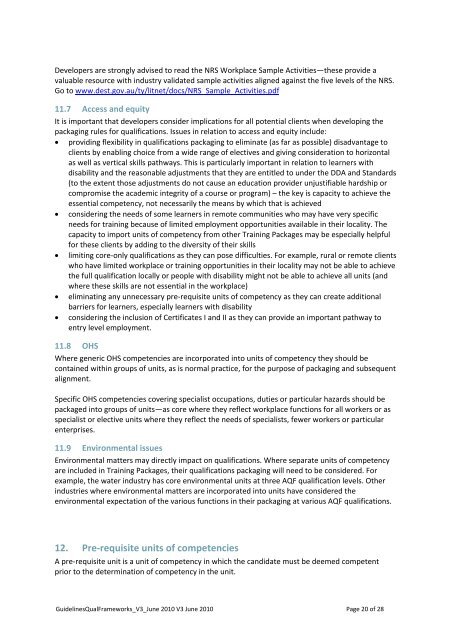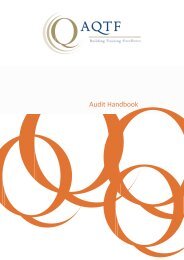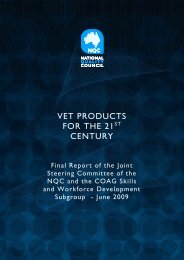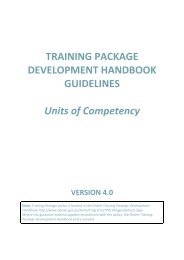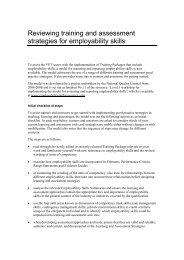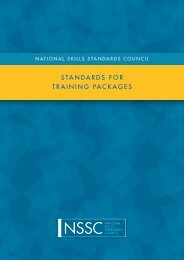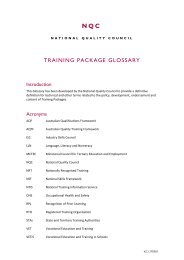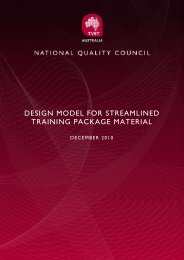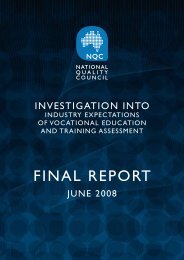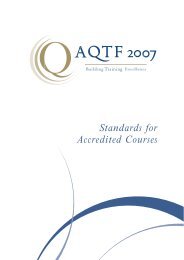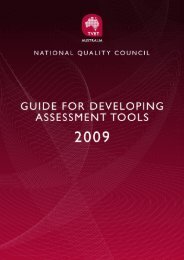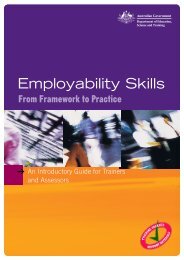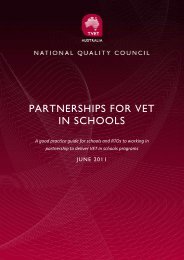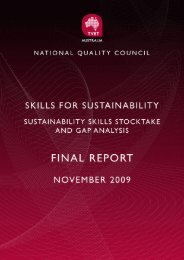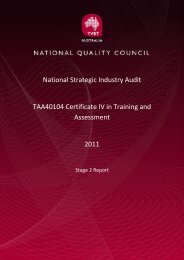Training package development handbook guidelines
Training package development handbook guidelines
Training package development handbook guidelines
Create successful ePaper yourself
Turn your PDF publications into a flip-book with our unique Google optimized e-Paper software.
Developers are strongly advised to read the NRS Workplace Sample Activities—these provide a<br />
valuable resource with industry validated sample activities aligned against the five levels of the NRS.<br />
Go to www.dest.gov.au/ty/litnet/docs/NRS_Sample_Activities.pdf<br />
11.7 Access and equity<br />
It is important that developers consider implications for all potential clients when developing the<br />
packaging rules for qualifications. Issues in relation to access and equity include:<br />
• providing flexibility in qualifications packaging to eliminate (as far as possible) disadvantage to<br />
clients by enabling choice from a wide range of electives and giving consideration to horizontal<br />
as well as vertical skills pathways. This is particularly important in relation to learners with<br />
disability and the reasonable adjustments that they are entitled to under the DDA and Standards<br />
(to the extent those adjustments do not cause an education provider unjustifiable hardship or<br />
compromise the academic integrity of a course or program) – the key is capacity to achieve the<br />
essential competency, not necessarily the means by which that is achieved<br />
• considering the needs of some learners in remote communities who may have very specific<br />
needs for training because of limited employment opportunities available in their locality. The<br />
capacity to import units of competency from other <strong>Training</strong> Packages may be especially helpful<br />
for these clients by adding to the diversity of their skills<br />
• limiting core‐only qualifications as they can pose difficulties. For example, rural or remote clients<br />
who have limited workplace or training opportunities in their locality may not be able to achieve<br />
the full qualification locally or people with disability might not be able to achieve all units (and<br />
where these skills are not essential in the workplace)<br />
• eliminating any unnecessary pre‐requisite units of competency as they can create additional<br />
barriers for learners, especially learners with disability<br />
• considering the inclusion of Certificates I and II as they can provide an important pathway to<br />
entry level employment.<br />
11.8 OHS<br />
Where generic OHS competencies are incorporated into units of competency they should be<br />
contained within groups of units, as is normal practice, for the purpose of packaging and subsequent<br />
alignment.<br />
Specific OHS competencies covering specialist occupations, duties or particular hazards should be<br />
<strong>package</strong>d into groups of units—as core where they reflect workplace functions for all workers or as<br />
specialist or elective units where they reflect the needs of specialists, fewer workers or particular<br />
enterprises.<br />
11.9 Environmental issues<br />
Environmental matters may directly impact on qualifications. Where separate units of competency<br />
are included in <strong>Training</strong> Packages, their qualifications packaging will need to be considered. For<br />
example, the water industry has core environmental units at three AQF qualification levels. Other<br />
industries where environmental matters are incorporated into units have considered the<br />
environmental expectation of the various functions in their packaging at various AQF qualifications.<br />
12. Pre‐requisite units of competencies<br />
A pre‐requisite unit is a unit of competency in which the candidate must be deemed competent<br />
prior to the determination of competency in the unit.<br />
GuidelinesQualFrameworks_V3_June 2010 V3 June 2010 Page 20 of 28


